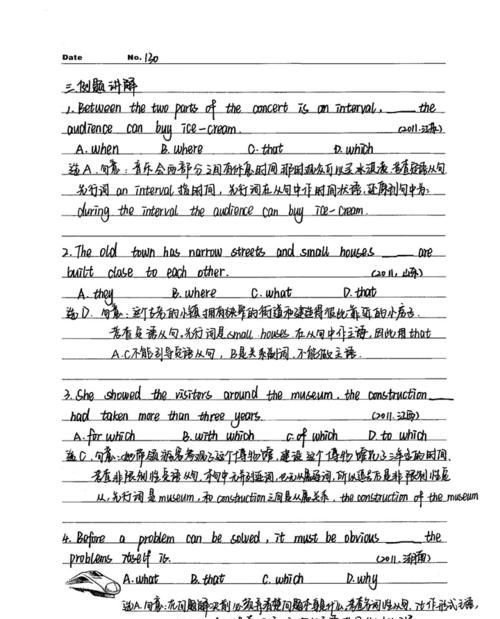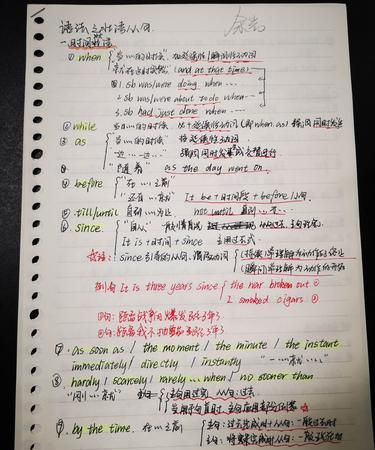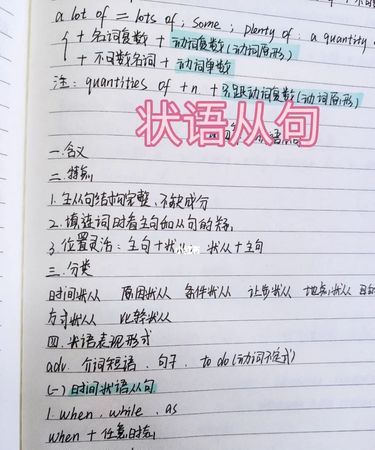本文目录
初中状语从句知识点归纳英语
状语从句-概述
状语从句(Adverbial Clauses)在四、六级、研究生入学考试以及各类应试中是一项比较重要的测试内容。引导状语从句的是一些连词,它们的位置比较灵活,可以置于句首,也可以置于句末。
状语从句-时间状语从句
(1) when引导的时间状语从句
①.when引导的时间状语从句,其动词既可以是延续性动作的动词,也可以是瞬间性动作的动词,而且可以表示主句的动作和从句的动作同时发生,或者从句的动作发生在主句的动作之前。如:
when you apply for a job, you must present your credentials.
当你申请工作时,你必须递交你的有关证件。(同时)
when the students heard the teacher’s footsteps, they all atopped talking.
当学生们听到老师的脚步声时,他们都停止了讲话。(从句动作发生在前)
② when还可表示just then(正在那时,突然)的意思,此时其所引导的从句只放在主句之后。如:
we were about to start when it began to rain.
我们正要动身,突然天下起雨来。
The game had hardly/scarcely/barely begun when it started raining.
比赛刚刚开始就下起雨来。
(2) as引导的时间状语从句
as引导的时间状语从句其动词的动作是延续性的,而且侧重表示主句和从句的动作并相发生:
We were having breakfast as she was combing her hair.
她梳头时我们在吃早饭。
It will warm up a little bit on Sunday as the cold front passes.
寒流一过,星期日就会有点暖意了。
(3) while引导的时间状语从句
while表示“在某一段时间里”或“在……期间”,其所引导的从句的动作是延续性的,并侧重表示和主句的动作同时发生。如:
When the teacher paraphrased the text in English, the students listened attentively and took notes.
当老师用英语解释课文时,学生们聚精会神地听并做着笔记。
I can learn while I work.
我可以边工作边学习。
(4) before引导的时间状语从句
① before“在……之前”
I have finished my dissertation before my supervisor went abroad.
在我的导师出国之前,我已完成了我的学位论文。
I’ll be back before you have left.
你离开之前我就会回来。
② before“……之后才”
It may be many years before we meet again.
可能要过许多年我们才能再见了。
It was three days before I came back.
他三天后才回来。
(5) as soon as/once/directly/the instant等引导的时间状语从句
as soon as 是最常见的表示“一……就”的从属连词,其他连词还有once,directly,immediately,instantly,the instant (that),the minute(that) ,the moment(that)等,它们通常都可与as soon as换用。如:
As soon as we got home, the telephone rang.
我们一到家,电话就响了。
I recognized her immediately I saw her.
我一看见她就认出她来了。
Directly the teacher came in everyone was quiet.
老师一进来,大家就静了下来。
(6) hardly...when/no sooner...than引导的时间状语从句
关联从属连词hardly/barely/scarcely...when和no sooner...than的意思是“刚……就”,它们所引导的从句中的谓语动词通常为过去完成时。如:
He had no sooner (no sooner had he)arrived home than he was asked to start on another journey.
他刚一到家,就又要他出另一次差。
No sooner had the words been spoken than he realized that he should have remained silent.
这些话刚一出口,他就意识到自己应该保持沉默。
(7) since引导的时间状语从句
在含有since引导的时间状语从句的复合句中,从句的谓语动词通常为一般过去时,主句的谓语动词通常为现在完成时、过去完成时和一般现在时: We’ve never met since we graduated from the college.
大学毕业后我们就再没见过面。
Great changes have taken place since you left.
你走了以后,这里发生了巨大变化。
(8) till/until引导的时间状语从句 till和until同义,作“直到……时(为止)”解,till多用于非正式文体,until多用于句首。如:
Donald will remain in college until(till) he finishes his Ph.D course.
唐纳德将留在学校直到完成他的博士学位课程。
I won’t go with you until(till) I finished my homework.
等我做完作业我才和你一起去。
(9) whenever/each time/every time引导的时间状语从句
whenever在引导时间状语从句时作“每当;每次”解,each time和every time与whenever同义,通常可以与它换用。如:
The roof leaks whenever it rains.
每逢下雨屋顶就漏雨。
Whenever certain chemicals are mixed together,heat is produced.
某些化学物质被混到一起时,就会产生热。
Whenever/ Every time/ Each time I met her, she was studying.
我每次看见她时,她总是在学习。
状语从句-地点状语从句
(1) when引导的时间状语从句
从属连词where“在(或到)……的地方”
Where there is a will, there is a way.
有志者事竟成。
Put it where you found it.
把它放在原来的地方。
① where 在地点状语从句中,除指地点外,还可指处境等。如:
He said he was happy where he was.
他说他对自己的处境很满意。
It’s your fault that she is where she is.
她今天落到这个地步都怪你。
② 有时地点状语从句中的某些词可以省略。如:
Fill in the blanks with the given phrases. Change the form where necessary.
用所给的短语填空,必要的地方可以改变其形式。
Avoid structure of this kind where possible.
只要可能,就要避免这种结构。
(2) wherever引导的地点状语从句
从属连词wherever“在(或到)……的各个地方”:
You can go wherever(anywhere) you like these days.
这些天你可以去你想去的地方。
Where (Everywhere) they went, the experts were warmly welcomed.
专家每到一处, 都受到热烈的欢迎。
Sit down wherever you like.
你喜欢坐哪儿就坐哪儿。
状语从句-原因状语从句
(1) because引导的原因状语从句
because表示人们不知道的直接的原因或理由,着重点在从句,其所引导的从句,为全句句意的中心所在。通常用于回答why引出的疑问句,语气最强,除特别强调外,该从句一般位于主句后面。
I didn’t go abrord with her because I couldn’t afford it.
我没有和她一起出国是因为费用太高。
Don’t scamp your work because you are pressed for time.
不要因为时间仓促而马马虎虎。
(2) as引导的原因状语从句
as引导的原因状语从句所传递的通常是已知信息,从句多位于主句之前,通常可以和since换用。如:
As I didn’t know the way,I asked a policeman.
我不认识路,因而问警察。
As it is snowing, we shall not climb the mountain.
由于在下雪,我们不去爬山了。
(3) since引导的原因状语从句
since引导的原因状语从句所传递的通常是已知信息,从句多位于主句之前,通常可以和as换用。如:
Since traveling by air is much faster,they decided to take a plane.
既然乘飞机旅行快得多,他们就决定坐飞机。
Since you won’t help me ,I’ll ask someone else.
你既然不帮我,那我就请别人帮忙。
(4) now(that)引导的原因状语从句
now(that)“因为;既然”,通常可以和since换用。其中that可省去,用来表示一种新的情况,再加以推论。如:
Now(that) you?蒺ve passed your test you can drive on your own.
你既已考试合格,就可以独自开车了。
I do remember,now (that) you mention it.
你这一提,我倒的确想起来了。
(5) seeing (that)引导的原因状语从句
Seeing (that)“鉴于;由于”,通常用于非正式文体。如:
Seeing (that) the weather is bad,we’ll stay at home.
天气不好,我们还是呆在家里吧。
Seeing that he’ s ill,he’s unlikely to come.
(6) in that引导的原因状语从句
in that“因为;基于……的理由”,可以和because换用,多用于正式文体,它所引导的原因状语从句总是位于主句之后。如:
Advertisement is distinguished from other forms of communication in that the advertiser pays for the message to be delivered. 广告不同于其他交际形式,因为登广告的人要为其所提供的信息付费。
I’m in a slightly awkward position, in that he’s not arriving until 10th.
我的处境有点难堪,因为他要十号才来。
状语从句-目的状语从句
(1) in order that引导的目的状语从句
in order that“为了;以便”。多用于正式文体,通常可以与so that换用。如:
You stopped at Hangzhou in order that they could go around West Lake.
他们在杭州停了下来,以便游览西湖。
The expert spoke slowly in order that everyone should understand.
专家讲得很慢,以便人人听得懂。
(2) so (that)引导的目的状语从句
so that“为了;以便”。so that通常可以与in order that换用,它所引导的目的状语从句总是放在主句之后,在非正式文体中,常省略that。如:
Speak clearly so that they may understand you.
你要讲得清楚,他们才听得懂。
She wanted tea ready at seven so she could be out by eight.
她要七点钟备好茶点,这样她八点以前就可以出门了。
(3) in case/for fear (that)/lest等引导的目的状语从句
in case,for fear(that)和lest这三个从属连词都表示否定目的,意思是“以免”,“以防”。in case多用于英国英语,它所引导的从句中的谓语动词可以是陈述语气形式,也可以是虚拟语气形式;for fear(that)引导的从句中的谓语带有may,might,should等情态动词;lest用于正式文体,它所引导的从句中的谓语动词用虚拟语气形式。如:
Take your umbrella with you,lest it should rain.
带上你的伞,以防下雨。
Take your umbrella in case it rains.
带上你的伞,以防下雨。
He took an umbrella with him for fear that it might rain.
他带了一把伞,以防下雨。
状语从句-结果状语从句
(1) so that引导的结果状语从句
① so that引导的结果状语从句只能位于主句之后,中间可以有逗号。如:
Suddenly it began to rain heavily,so that it was almost impossible to carry on driving.
突然下起了大雨,几乎无法继续开车。
Linda phoned me in on arrival so that I know she was safe and sound.
琳达到达后给我打了电话,因而我知道她平安无事。
②“so that”既可引导结果状语从句也可引导目的状语从句。究竟是引导的结果状语从句还是目的状语从句,除了根据句意来判断外,还可根据结构形式来加以判断。若从句前有逗号,一般为结果状语从句,如果从句中有情态动词,通常则为目的状语从句。如:
They started out early, so that they didn’t miss the train.
他们早早就出发了,所以没误火车。(结果状语从句)
They started out early so that they would not miss the train.
他们早早出发是为了不误火车。(目的状语从句)
(2) so...that引导的结果状语从句
so...that“如此……以致”,that在非正式文体中可以省略,so后面接形容词或副词。如:
She spoke so fast that nobody could catch what she was saying.
她说话如此之快竟没有人听出来她在讲什么。
There is so little time left that I have to tell you about it latter.
现在剩下的时间不多了,我只好以后再给你讲这件事。
(3) such...that引导的结果状语从句
引导结果状语从句的such...that的具体内容是:such+a/an+形容词+名词+that从句。其中的名词可以是可数名词的单数或复数,也可以是不可数名词。such+a/an+形容词+单数名词+that从句可换成so+形容词+a/an+单数名词+that从句。如:
The Japanese student made such rapid progress that he soon began to write article in Chinese.
那个日本留学生进步很快,不久就开始用中文写文章了。
The professor told us such a funny story that all the students laughed.
(=The professor told us so funny a story that all the students laughed.)
教授讲了个很有趣的故事,(以致于)所有的学生都笑了起来。
(4) such that引导的结果状语从句
such that引导的结果状语从句多用于正式文体,主句为“主—系—表”句型。如:
The force of the explosion was such that it blew out all the windows.
爆炸的力量很大,所有的窗户都被炸掉了。
His anger was such that he lost control of himself.
他气得不能克制自己的感情。
状语从句-条件状语从句
(1) if引导的条件状语从句
if可引导非真实条件状语从句(见“虚拟语气”)和真实条件状语从句。如:
If he said that,he can’t be telling the truth.
如果他说了那样的话,他不可能是说实话。
(2) unless引导的条件状语从句
unless引导的是否定条件状语从句,在意义上相当于if...not,而且语气较强,一般不用于虚拟语气。如:
You’ll be late unless you hurry.
你会迟到的,如果不赶快的话。
(3) if only引导的条件状语从句
if only在引导条件状语从句时意为“只要;如果”。如:
I’ll let you use the car if only you keep it in good condition.
只要你把车保养好,我就让你用。
(4) as/so long as引导的条件状语从句
as/so long as意为“只要;如果”。如:
As long as it doesn’t rain, we can play.
只要不下雨我们就能玩。
(5) provided (that)/providing (that)引导的条件状语从句
provided (that)/providing (that)意为“如果;只要”。如:
I will agree to go provided’ providing (that my expense are paid.)
假如为我负担费用,我就同意去。
Providing you promise not to tell anyone else I’ll explain the secret.
状语从句-让步状语从句
(1) although/though引导的让步状语从句
although和though,都作“虽然;尽管”解,通常可以换用,although的语气较重。如果要强调“但是”语气,可使用yet,still或nevertheless来表示“但是”、“依然”或“然而”之意。
Although they have been talking for a long time, he cannot make her believe him.
虽然和她谈了半天,他还是不能让她信任自己。
(2) even if引导的让步状语从句
even if “即使,纵然”,从句表示的是尚未发生的动作或存在的情况。如:
Even if it rains tomorrow,we won’t change our plan.
即使明天下雨,我们也决不改变计划。
Even if I failed again, I will not give up the experiment.
即使我再次失败,我也决不会放弃实验。
(3) even though引导的让步状语从句
even though“虽然,尽管”,从句所表示的是已经发生的动作或存在的情况,通常可以和although/though换用。如:
Even though I didn’t understand a word,I kept smiling.
即使我一个字也不懂,我还是保持微笑。
Even though you say so,I do not believe it.
即使你这样说,我也不信。
(4) much as引导的让步状语从句
much as“虽然,尽管”,通常可以和although/though换用:
Much as I’d like to,I can’t come.
我虽然很想来,但是来不了。
Much as I admire his courage,I don’t think he acted wisely.
我虽然佩服他的勇气,但我认为他这样做是不聪明的。
(5) while引导的让步状语从句
while“虽然,尽管”,多用于正式文体,通常可换作although/though。如:
While I understand your point of view,I do not share it.
我虽了解你的观点,但不敢苟同。
While I sympathize,I really can’t do very much to help.
虽然我很同情,但我确实帮不了什么忙。
(6) whatever/no matter what引导的让步状语从句
whatever和no matter what用法相同,都作“无论什么”解,后者多用于非正式文体。如:
Whatever/No matter what he says,don’t go.
不管他说什么,你都不要走。
We are determined to fulfill the task,whatever/no matter what happens.
不管发生什么了,我们决心完成任务。
(7) whichever/no matter which引导的让步状语从句
whichever和no matter which用法相同,都作“无论哪个”解,后者多用于非正式文体。如:
Whichever/No matter which you buy, there is a six-month guarantee.
不论你买哪个,都有六个月的保修期。
Whichever/No matter which of the two men had stolen her purseBarbara was determined to find them.
不管这两个人是谁偷了她的钱包,芭芭拉决心找到他们。
(8) whoever/no matter who引导的让步状语从句
whoever和no matter who用法相同,都作“无论谁”解,后者多用于非正式文体。如:
You can’t come in, whoever you are.
不管你是谁,都不能进来。
Whoever/No matter who wants to speak to me on the phone, tell him I’m busy.
不管谁要我接电话, 就说我现在正忙着呢。
(9) whereverno matter where引导的让步状语从句
wherever和no matter where用法相同,都作“无论在(或到)哪里”解,后者多用于非正式文体。如:
Wherever/No matter where you go, I’m right here waiting fo ryou.
无论你到哪里,我都依然在这里等着你。
(10) however/no matter how引导的让步状语从句
however和no matter how用法相同,都作“无论如何……”解,后者多用于非正式文体。
However much you regret doing that, there is nothing you can do about it now.
无论你可能多么懊悔你曾经做过的事,现在也无济于事了。
However high it may be,it can’t reach the sky.
它不论有多高,也高不到天上去。
(11) whenever/no matter when引导的让步状语从句
whenever和no matter when用法相同,都作“无论何时”解,后者多用于非正式文体。如:
Whenever I’m unhappy,he cheers me up.
每当我不高兴时,他就给我鼓劲儿。
(12)(no matter) whether...or引导的让步状语从句
whether...or和no matter whether...or用法相同,都作“不论……还是”解,后者的语气强一些。如:
When it rains or not, we’re playing football on Sunday.
无论下不下雨,我们星期天一定踢足球。
(13) as引导的让步状语从句
as在引导让步状语从句时作“虽然;尽管”和“即使”解,但是它不位于句首,在它前面的可以是形容词、名词、副词等。如:
Strong as you maybe, you cannot lift it.
虽然你可能很有力气,你却无法把它提起来。
Late as it was, they continued to study.
时间尽管不早了,他们仍继续学习。
状语从句-方式状语从句
(1) as引导的方式状语从句
as在引导方式状语从句时意为“以……方式;如同……那样”,从句有时是省略句。如:
Do as I say. 要照我说的做。
I did just as you told me. 我正是照你说的办的。
Air is to man as water is to fish. 空气之于人犹如水之于鱼。
(2) as if/as though引导的方式状语从句
as if和as though的用法相同,都作“好像,仿佛”解。如:
二者引导的状语从句往往用虚拟语气,表示与事实相反。as if比as though更为常用。但也可用陈述语气,表示所说的情况是事实或实现的可能性较大。如:
They looked at me as if ‘as though I were mad.
他们瞧着我好像我发疯了似的。
They look as if/as though they know each other.
他们看来好像互相认识。
状语从句-比较状语从句
(1) as...as 引导的比较状语从句
as...as表示同级比较,主句中用形容词或副词的原级形式,从句常常为省略句。如:
We were as fortunate as them (they were)
我们和他们一样幸运。
I hope she will make as much progress as you (have done).
我希望她将取得和你同样的进步。
(2) not so/as...as 引导的比较状语从句
not so/as...as表示同级比较,主句中用形容词或副词的原级形式,从句常常为省略句。如:
That’s not so/as simple as it sounds.
那件事情不像听起来那么简单。
(3) than引导的比较状语从句
than引导的比较状语从句表示同等比较,主句中用形容词或副词的比较级形式,从句常常为省略句。如:
He has lived here longer than I(has lived).
他在这儿住的时间比我长。
They love the girl than(they love) him.
他们爱这个女孩而不爱他。
(4) the..., the...引导的比较状语从句
The more you listen to English, the easier it becomes.
英语听得越多就越容易。

if引导的条件状语从句例句
状语从句的分类:
时间状语从句
凡是从句都必须有引导词,引导时间状语从句的词有when,before,after,until,as soon as,while 等。条件状语从句
主要看一下由if引导的条件状语从句。if 意为“如果”,引导条件状语从句时,表示假如有从句的动作发生就(不)会有主句的动作发生。例如:
If it doesn't rain tomorrow,we will go there by bike.如果明天不下雨,我们就骑自行车去那里。
If I get there early,I can see the doctor quickly.如果我早早地到那里,我就可以快点看病。地点状语从句用法要点
常用where(哪里)和wherever(无论哪里)eg.
Where there is a will,there is a way. 有志者,事竟成。
We will go wherever the motherland need us most. 我们要到祖国最需要的地方去。原因状语从句用法要点
常用的引导连词有because,as和since,三者的区别是:在回答问题的时候,使用because;对于显而易见的原因,常用as或since;as和since的从句常放在主句之前,而because的从句常放在主句之后。eg.
Why did you go? I went because Tom told me to go. 你为何去?那是因为汤姆叫我去。
He was angry not because we were late but because we made a noise.
他很生气不是因为我们来迟了,而是因为我们弄出了声音。
As it was raining hard,we had to be indoors. 由于雨太大,我们只好呆在家里。
Since you feel ill,you'd better not go to work. 既然你感觉不舒服,你最好不要去上班了。目的状语从句用法要点
常用的引导连词有so that,that和in order that译为:以便,为了,目的是。eg.
Please speak more slowly so that we can make full notes. 请讲慢一点,以便我们能作详细笔记。
I shall write down your address that I may not forget. 我要把你的地址记下来,以免忘记。
I sent the letter by air mail in order that it might reach him in time. 这封信我以航空信发出,以便他能及时收到。
注:目的状语从句可以用动词不定式来替换做目的状语。eg.
We work harder than usual finish it in a week. 我们比平常加倍努力工作以在一周内完成工作。

状语从句
状语从句重点是掌握连接词即可翻译句子 ,掌握引导九类状语从句的有关连接词的用法特点和意义是学习状语从句的关键,只有记住连接词就能够识别是何种状语从句,从而正确分析句子的结构并理解句子的意思。
when相当于at the time(在......时刻)
一、主句一般过去时+从句一般过去时
i started my dinner when he left 他走之后,我才开始吃晚饭
二、主句一般过去时+从句过去完成时
i started my dineer when he had left
一、二两句意思区别不大,两句都表示从句动作先发生,但从句过去完成时更加强调了从句动作先发生。
下面这种和主句、从句没有关系,只与动作长短有关系,短暂动作用一般过去时,延续动作用过去进行时:
1、主句一般过去时+从句过去进行时 (during the time 当......时候)
the doorbell rang when i was telephoning。 门铃响的时候,我正在打电话
短暂动作rang用一般过去时,延续动作用过去进行时。
2、主句过去进行时+从句一般过去时 (at the time正在那时(在......时刻))
i was telephoning when the doorbell rang。 我当时正在打电话,突然门铃响了
when + 短暂动作突然发生时,可以加suddenly。
i was telephoning when suddenly the doorbell rang。
1)i was telephoning Harry when she arrived
2)i telephoned Harry when she arrived
只有主句时态不同,2句强调从句动作先发生,1句强调主句是一个持续动作。
3、主句一般将来时+从句一般现在时
表示将来动作,从句一般现在时表示将来
i'ii speak to him when he arrvies
when还有用法看过去进行时学习笔记
while 意思相当于during that time(在...期间),从句谓语动词接延续动词
when 既可以表示at that time(在...时刻,谓语短暂动词),也可以表示during that time(在...期间,谓语延续动词)
until
until本质思维是表示“一个(主句)动作一直持续到某一个时间点”
until前面的主句或句子的谓语必须是延续性的,until后接的从句谓语须是短暂动词或时间点
也就是:连词:主句延续动词+until+从句短暂动词
介词:延续动词+until+时间点
wait until he comes back
i will be away from my office until next Tuesday (做介词)
若主句谓语是短暂动词,则要用否定形式,not......until
一......就结构
有一些时间连词表达主句的动作和从句的动作相继发生,两者之间时间间隔不长,主句从句都用短暂动词。
从句动作先于主句动作发生:
关系连词有:as soon as,once,the minute,the moment,the instant,immediately,directly,instantly等
表示将来时,从句用一般现在时表将来,主句用一般将来时
we will leave as soon as it stops raining
表示过去的动作,主句和从句都用一般过去时
it began to rain as soon as i arrived home
其它连词例句:
it began to rain immediately i arrived home
don't trust those who leave their friends the moment they get into difficulty
主句动作先于从句动作
表示这一时间关系的连词有:hardly...when,scarcely...when和no sooner...than,一般多用来表示过去的动作,主句多用过去完成时,且常倒装,从句用一般过去时。可与as soon as等从句、主句互换。
no sooner had i arrive home than it began to rain
it began to rain as soon as i arrived home
no sooner had the storm started than all the lights went out
hardly had i arrived home when it began to rain
scarcely had i started to type my paper when the tlephone rang
原因状语从句有四个连词:because,for,as,since
because语气最强,只有它才能用来回答why的问句,引出的原因一般是听话人所不知道或最感兴趣的,只有because才能被强调词如only,just或perhaps等来修饰
my friends dislike me because i'm handsome and successful
连词since表示人们已知的事情,是不需强调的原因,所以学译为“既然”,通常放在句首
since you are an english major,i guess you can help me with this sentence
既然你是学英语专业的,我猜想你能帮我解决这个句子
as与since用法差不多,表示说话人看来理由已经很明显,不需要用because强调
as monday is a national holiday,all govenment offices will be closed
由于周一是法定假日,所有政府机关都将休息
for表示推断的理由,对前面分句的内容加以解释或说明
it rained last night,for the ground is wet this morning
昨晚下雨了,因为今天早上地都湿了
as和for引导的主、从句,二者处于平等位置
because引导的从句显得比主句重要,强调原因
since引导的从句显得次要,而主句重要,以说明将要做什么事
介词表示因果关系:
because of ,due to,owing to 后面接名词,不能接从句
连词有:so that,in order that,that
从句中常含may might can could等情态动词
in order that意为“以便”
i truned off the tv in order that my roommate could study in peace and quiet
so that 意为“以便”
when i was a child,i would take a flashlight to bed with me so that i could read comic books without my parents' knowing about it
其它例句:
we climbed high (so) that we might get a better view
目的状语从句一般在主句之后,如需强调目的状语从句,则将其置于句首
in order that my roommate could study in peace and quiet,i turned off the tv
连词:so...that和such...that
从句都放在主句之后
so...that,so后面接形容词或副词
the food in our school canteen is so bad that flies go there to lose weight
such...that,such后面接名词
he is such a good teacher that everyone like him
为了强调可以将主句中的so,such引导的部分置于句首从而构成倒装结构
so fast does light gravel that it is difficult for us to imagine its speed
正常语序:ligfht travels so fast that it is difficult for us to imagine its speed
so terrible was the storm that the foofs were all ripped off
正常语序:the strom was so terrible that the roofs were all ripped off
such a fool was he that he believed her
he was such a fool that he believed her
常见连词:if(如果),unless(除非、如果不)
其他条件状语从句连词:
suppose (that),supposing (that),providing/provided(that),so long as,as long as,on condition that等
连词:though,although,even though,even if,此时,主句前不可用but,但可用yet或still
although he tried hard,yet/still he failed.
though he was inexperienced,he did a very good job
表让步介词despite,in spite of,for all
in spite of his inexperience,he did a very good job
inspite of his being inexperienced,he did a very good job
while位于句首,一般意为“尽管”,引导让步状语从句。
as引导的倒装句表示让步
1、形容词置句首
young as he is,he is knowledgeable 他虽然年轻,但知识渊博
2、副词置句首
much as i respect him,i can not agree with him 虽然我非常尊重他,但是我仍旧不同意他的意见
again as he failed in doing this experiment,he didn't lose his heart 尽管他的试验再次失败了,但是他并不灰心
3、名词置句着
child as he is,he is knowledgeable
lazy a boy as he is,he is kind to help others (名词短语)
以上句型中的as可用that,though代替,但较少这样使用,不可以用although
关于介词和连词的进一步说明:
介词后面可以接名词、名词短语、动名词或what引导的从句
连词后面可以接完整的陈述句、形容词(相当于省略句)、分词(相当于省略句)等
连词as用法
as...as结构前一个as是一个副词,后一个as才是比较状语从句的连词
1、as+形容词或副词+as
the work is not as difficult as you think
2、as+形容词+a(n)+可数句词单数+as
前一个as做副词修饰一个形容词,而这个形容词同时又修饰一个名词。注意不定冠词在形容词之前
Americans tend to think from small to large.let us take as simple an example as the addressing of envelopes
rarely has a technological development had as great an impact on so many aspects of social,econmic,and cultural development as the growth of electronics.
3、否定句中第一个as可用so代替
this room is not so large as the one we saw
4、为了保持句子平衡,从句还可以用倒装结构,此时结构是as...as+助动词+主语
small as it is,the ant is as much a creature as are all other animals on the earth
the computer revolution may well change society as fundamentally as did the industrial revolution
连词than用法
1、两个同类事物才可以比较,不是同类事物无法比较
he is taller than i (am)
the weather of the South is wetther than the North . 错误
the weather fo South和the North是两个截然不同的事物,无法比较,只能用南方的天气和北方的天气这两个同类事物才能比较
2、主句中必须有比较级形式出现
there are few electronic applications more likely to raise fears regarding future employment opportunities than rebots3
3、为保持句子平衡,从句可以全部或部分倒装
结构如下:than+助动词+主语
On the whole,ambitious students are more likely to succeed in their studies than are those with little ambition
Foreign-born Asians and Hispanics "have higher rates of intermarriage than do U.S-born whites and blacks"
Ichthyosaurs had a higher chance of being preserved than did terrestrial creatures because,as marine animals,they tended to live in environments less subject to erosion
表示倍数比较三种句型结构
表示倍数关系的连词: time和twice
1.“倍数+比较级”结构:A is three times bigger(或其他形容词的比较级) than B
2.“倍数+as...as”结构:A is three times as big(或其他形容词原级) as B
3.“倍数+名词“结构:A is three times the size(或其他形容词对应的名词形式) of B
the more...,the more句型结构
表示“越...,越...”,将分句中的某个成分变为比较级之后提到句首,这个比较级部分必须是各自的分句中充当一定的成分。
1句中错误,比较级部分没有在句中充当成分。
2句正确比较级部分在句中做状语。
3句中比较级部分在分句中充当表语,相当于your words are more exact;it is easier for people to understand you。
4句中比较级部分在分句中充当宾语,也是正确的。
前半部分为从句,后半部分是主句,这就是为什么前半句常用一般现在时态,后半句用一般将来时态,类似其他状语从句“主句用将来时,从句用一般现在时”的规则,别外,翻译成汉语时,一般先译从句,后译主句。
连词:as,like,as if,as though,the way等
When in Rome,do as the Romans do 入乡随俗
Do it the way you were taught 按照教给你的那样做
He looks as though/as if he is an actor 他看上去像一个演员
like用法,这段话很经典:
Work like you don't need the money.
Love like you've never been hurt.
Dance like nobody's watching.
Sing like nobody's listening.
Live like it's heaven on earth.
去工作吧,犹如你不需要金钱。
去爱吧,犹如你从未曾被伤害过。
去舞蹈吧,犹如无人在一旁观看。
去歌唱吧,犹如无人在一边谛听。
热爱生活吧,犹如这里是人间乐土。

高中英语定语从句知识点总结笔记
英语定语从句知识点总结笔记:
一、定语从句即指在主从复合句用作定语的从句。定语从句通常修饰名词或代词,对它进行限制、描绘和说明。受定语从句修饰的词语叫先行词,引导定语从句的词语叫关系词。关系词按其性质又分关系代词和关系副词。定语从句又分为限制性定语从句和非限制性定语从句。
二、关系代词有who,whom,whose,that,which等,在从句中可作主语、宾语,定语等;关系副词有when,where,why等词,在定语从句中只用作状语。
三、关系代词和关系副词必须位于从句之首,主句先行词之后,起着连接先行词和从句的作用,同时在从句中又充当句子成分。关系代词和关系副词的用法当先行词为人时用who作主语,whom作宾语。

四、只用which不用that的情况:
1、 当介词放在关系代词之前时。
2、 在非限制性定语从句中。
3、 当关系代词指整个主句的概念时。
五、只用who不用that的情况:
1、当先行词是one、ones、anyone或those时。
2、there be 结构中。
3、当先行词是人,后面有较长修饰语时。
4、为了避免重复或引起歧义。
5、当先行词是I,you,he,they等时(常用于谚语中)。
6、先行词是指成员的集体名词。
7、who可以引导非限制性定语从句。
8、先行词是拟人化的名词。
9、先行词指特定的人时用who,不指特定的人用that
以上就是关于状语从句笔记整理手写图片 ,初中状语从句知识点归纳英语的全部内容,以及状语从句笔记整理手写图片 的相关内容,希望能够帮到您。
